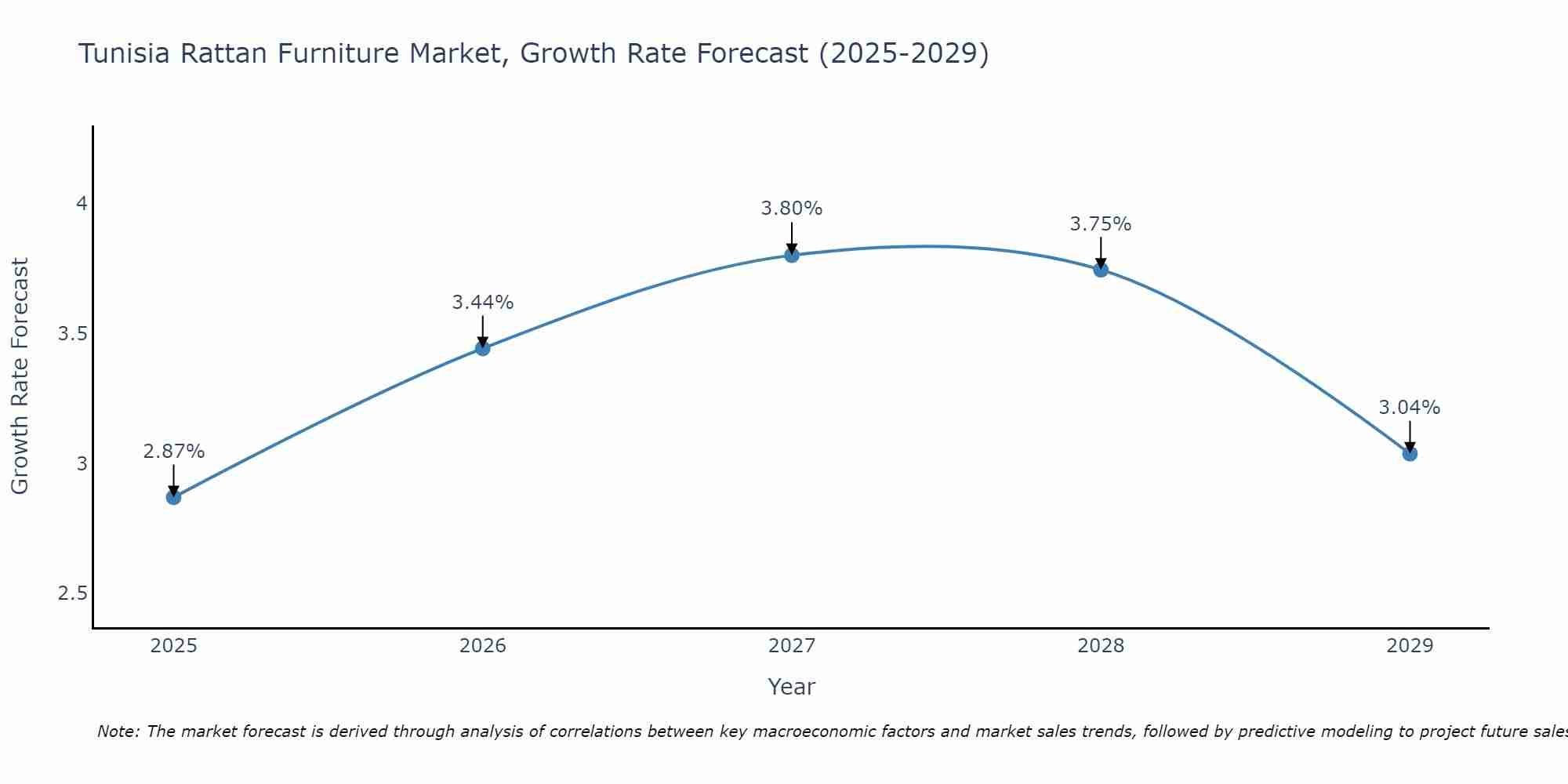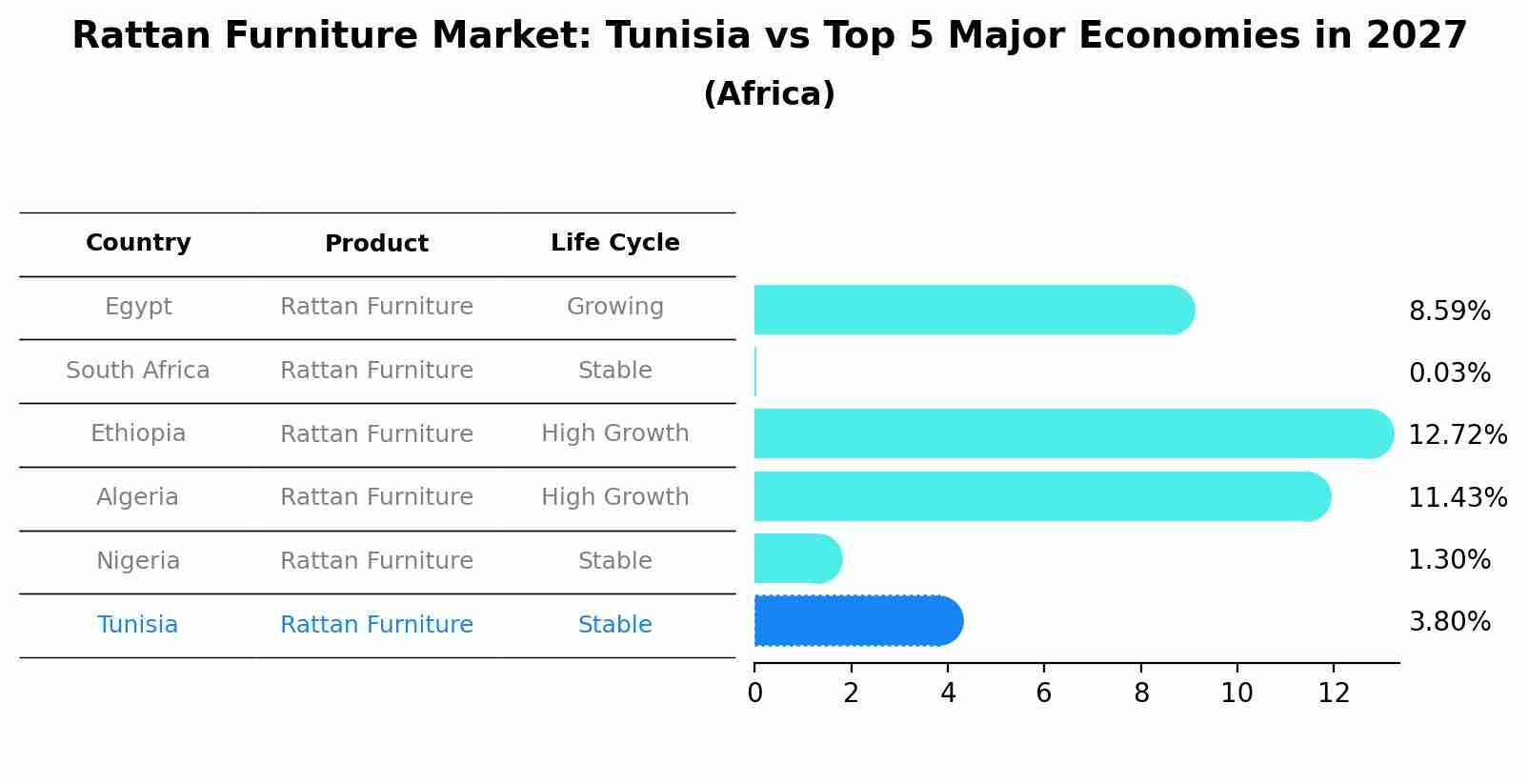Tunisia Rattan Furniture Market Outlook | COVID-19 IMPACT, Share, Revenue, Growth, Companies, Size, Trends, Forecast, Industry, Value & Analysis
| Product Code: ETC373014 | Publication Date: Aug 2022 | Updated Date: Jul 2025 | Product Type: Market Research Report | |
| Publisher: 6Wresearch | Author: Shubham Deep | No. of Pages: 75 | No. of Figures: 35 | No. of Tables: 20 |
Tunisia Rattan Furniture Market Size Growth Rate
The Tunisia Rattan Furniture Market is projected to witness mixed growth rate patterns during 2025 to 2029. Starting at 2.87% in 2025, the market peaks at 3.80% in 2027, and settles at 3.04% by 2029.

Rattan Furniture Market: Tunisia vs Top 5 Major Economies in 2027 (Africa)
The Rattan Furniture market in Tunisia is projected to grow at a stable growth rate of 3.80% by 2027, highlighting the country's increasing focus on advanced technologies within the Africa region, where Egypt holds the dominant position, followed closely by South Africa, Ethiopia, Algeria and Nigeria, shaping overall regional demand.

Tunisia Rattan Furniture Market Synopsis
The Tunisia Rattan Furniture Market is experiencing steady growth due to the rising demand for eco-friendly and sustainable furniture options. Rattan furniture, known for its durability and natural aesthetic appeal, has gained popularity among consumers looking to furnish their homes with environmentally friendly products. The market is driven by factors such as increasing disposable incomes, changing consumer preferences towards natural materials, and a growing trend towards rustic and bohemian interior design styles. Key players in the market are focusing on product innovation, quality craftsmanship, and expanding their distribution channels to cater to the growing demand. With a strong emphasis on traditional craftsmanship and unique designs, the Tunisia Rattan Furniture Market is poised for further growth in the coming years.
Tunisia Rattan Furniture Market Trends
The Tunisia Rattan Furniture Market is experiencing a surge in demand due to the growing popularity of eco-friendly and sustainable home decor options. Consumers are increasingly drawn to the natural and organic aesthetics of rattan furniture, which complements modern and bohemian interior design styles. Furthermore, the rising trend of outdoor living spaces and the preference for lightweight and durable furniture are driving the market growth. Manufacturers are focusing on innovative designs, incorporating rattan with other materials such as metal or glass to cater to diverse consumer preferences. E-commerce platforms are also playing a significant role in expanding the market reach, offering a wide selection of rattan furniture to customers across Tunisia. Overall, the Tunisia Rattan Furniture Market is poised for continued growth in the coming years.
Tunisia Rattan Furniture Market Challenges
In the Tunisia Rattan Furniture Market, several challenges are faced, including competition from imported furniture, fluctuating raw material prices, and limited consumer awareness about the benefits of rattan furniture. Imported furniture from other countries often offers lower prices, posing a threat to local rattan furniture manufacturers. Additionally, the fluctuation of raw material prices, particularly rattan, can impact production costs and pricing strategies. Furthermore, the lack of consumer awareness about the sustainability and durability of rattan furniture hinders market growth. Overcoming these challenges requires efforts to enhance product quality, establish effective marketing strategies to educate consumers, and increase collaboration within the industry to address raw material price fluctuations.
Tunisia Rattan Furniture Market Investment Opportunities
The Tunisia Rattan Furniture Market presents promising investment opportunities due to the growing demand for eco-friendly and sustainable furniture options. Rattan furniture is gaining popularity among consumers for its natural aesthetic appeal and durability. Investors can capitalize on this trend by exploring opportunities to invest in rattan furniture manufacturing companies, retail outlets, or online platforms catering to the growing demand for rattan furniture in Tunisia. Additionally, there is potential for partnerships with local artisans or cooperatives to produce unique and high-quality rattan furniture pieces for both domestic and international markets. Overall, the Tunisia Rattan Furniture Market offers a lucrative investment landscape for those looking to tap into the rising demand for environmentally-friendly and stylish furniture options.
Jordan Agar Market Government Policies
The government of Tunisia has implemented policies to support the rattan furniture market, aimed at promoting sustainable production practices and encouraging exports. These policies include providing financial incentives and technical assistance to rattan furniture manufacturers, as well as implementing regulations to ensure environmental sustainability and quality standards in production processes. Additionally, the government has established trade agreements to facilitate the export of Tunisian rattan furniture products to international markets. Overall, these policies are designed to boost the competitiveness of the Tunisian rattan furniture industry, create employment opportunities, and contribute to the country`s economic growth.
Tunisia Rattan Furniture Market Future Outlook
The Tunisia Rattan Furniture Market is expected to experience steady growth in the coming years due to increasing consumer interest in sustainable and eco-friendly furniture options. Rattan furniture`s natural and organic appeal, coupled with its durability and versatility, will continue to attract consumers looking to enhance their living spaces with stylish and environmentally conscious pieces. The rise of online shopping platforms and e-commerce channels will also contribute to the market`s growth by offering a wider reach and convenience for customers. Additionally, the growing trend of home decor and interior design in Tunisia will drive demand for rattan furniture products, further boosting the market`s expansion in the foreseeable future.
Key Highlights of the Report:
- Tunisia Rattan Furniture Market Outlook
- Market Size of Tunisia Rattan Furniture Market, 2021
- Forecast of Tunisia Rattan Furniture Market, 2031
- Historical Data and Forecast of Tunisia Rattan Furniture Revenues & Volume for the Period 2018 - 2031
- Tunisia Rattan Furniture Market Trend Evolution
- Tunisia Rattan Furniture Market Drivers and Challenges
- Tunisia Rattan Furniture Price Trends
- Tunisia Rattan Furniture Porter's Five Forces
- Tunisia Rattan Furniture Industry Life Cycle
- Historical Data and Forecast of Tunisia Rattan Furniture Market Revenues & Volume By Type for the Period 2018 - 2031
- Historical Data and Forecast of Tunisia Rattan Furniture Market Revenues & Volume By Table for the Period 2018 - 2031
- Historical Data and Forecast of Tunisia Rattan Furniture Market Revenues & Volume By Chairs for the Period 2018 - 2031
- Historical Data and Forecast of Tunisia Rattan Furniture Market Revenues & Volume By Storage for the Period 2018 - 2031
- Historical Data and Forecast of Tunisia Rattan Furniture Market Revenues & Volume By Beds for the Period 2018 - 2031
- Historical Data and Forecast of Tunisia Rattan Furniture Market Revenues & Volume By Others for the Period 2018 - 2031
- Historical Data and Forecast of Tunisia Rattan Furniture Market Revenues & Volume By Application for the Period 2018 - 2031
- Historical Data and Forecast of Tunisia Rattan Furniture Market Revenues & Volume By Residential for the Period 2018 - 2031
- Historical Data and Forecast of Tunisia Rattan Furniture Market Revenues & Volume By Commercial for the Period 2018 - 2031
- Historical Data and Forecast of Tunisia Rattan Furniture Market Revenues & Volume By Distribution Channel for the Period 2018 - 2031
- Historical Data and Forecast of Tunisia Rattan Furniture Market Revenues & Volume By Multi-brand Stores for the Period 2018 - 2031
- Historical Data and Forecast of Tunisia Rattan Furniture Market Revenues & Volume By Exclusive Stores for the Period 2018 - 2031
- Historical Data and Forecast of Tunisia Rattan Furniture Market Revenues & Volume By Online for the Period 2018 - 2031
- Historical Data and Forecast of Tunisia Rattan Furniture Market Revenues & Volume By Other Distribution Channel for the Period 2018 - 2031
- Tunisia Rattan Furniture Import Export Trade Statistics
- Market Opportunity Assessment By Type
- Market Opportunity Assessment By Application
- Market Opportunity Assessment By Distribution Channel
- Tunisia Rattan Furniture Top Companies Market Share
- Tunisia Rattan Furniture Competitive Benchmarking By Technical and Operational Parameters
- Tunisia Rattan Furniture Company Profiles
- Tunisia Rattan Furniture Key Strategic Recommendations
Frequently Asked Questions About the Market Study (FAQs):
- Single User License$ 1,995
- Department License$ 2,400
- Site License$ 3,120
- Global License$ 3,795
Search
Thought Leadership and Analyst Meet
Our Clients
Related Reports
- South Africa Stationery Market (2025-2031) | Share, Size, Industry, Value, Growth, Revenue, Analysis, Trends, Segmentation & Outlook
- Afghanistan Rocking Chairs And Adirondack Chairs Market (2026-2032) | Size & Revenue, Competitive Landscape, Share, Segmentation, Industry, Value, Outlook, Analysis, Trends, Growth, Forecast, Companies
- Afghanistan Apparel Market (2026-2032) | Growth, Outlook, Industry, Segmentation, Forecast, Size, Companies, Trends, Value, Share, Analysis & Revenue
- Canada Oil and Gas Market (2026-2032) | Share, Segmentation, Value, Industry, Trends, Forecast, Analysis, Size & Revenue, Growth, Competitive Landscape, Outlook, Companies
- Germany Breakfast Food Market (2026-2032) | Industry, Share, Growth, Size, Companies, Value, Analysis, Revenue, Trends, Forecast & Outlook
- Australia Briquette Market (2025-2031) | Growth, Size, Revenue, Forecast, Analysis, Trends, Value, Share, Industry & Companies
- Vietnam System Integrator Market (2025-2031) | Size, Companies, Analysis, Industry, Value, Forecast, Growth, Trends, Revenue & Share
- ASEAN and Thailand Brain Health Supplements Market (2025-2031) | Strategy, Consumer Insights, Analysis, Investment Trends, Opportunities, Growth, Size, Share, Industry, Revenue, Segments, Value, Segmentation, Supply, Forecast, Restraints, Outlook, Competition, Drivers, Trends, Demand, Pricing Analysis, Competitive, Strategic Insights, Companies, Challenges
- ASEAN Bearings Market (2025-2031) | Strategy, Consumer Insights, Analysis, Investment Trends, Opportunities, Growth, Size, Share, Industry, Revenue, Segments, Value, Segmentation, Supply, Forecast, Restraints, Outlook, Competition, Drivers, Trends, Demand, Pricing Analysis, Competitive, Strategic Insights, Companies, Challenges
- Europe Flooring Market (2025-2031) | Outlook, Share, Industry, Trends, Forecast, Companies, Revenue, Size, Analysis, Growth & Value
Industry Events and Analyst Meet
Whitepaper
- Middle East & Africa Commercial Security Market Click here to view more.
- Middle East & Africa Fire Safety Systems & Equipment Market Click here to view more.
- GCC Drone Market Click here to view more.
- Middle East Lighting Fixture Market Click here to view more.
- GCC Physical & Perimeter Security Market Click here to view more.
6WResearch In News
- Doha a strategic location for EV manufacturing hub: IPA Qatar
- Demand for luxury TVs surging in the GCC, says Samsung
- Empowering Growth: The Thriving Journey of Bangladesh’s Cable Industry
- Demand for luxury TVs surging in the GCC, says Samsung
- Video call with a traditional healer? Once unthinkable, it’s now common in South Africa
- Intelligent Buildings To Smooth GCC’s Path To Net Zero


















